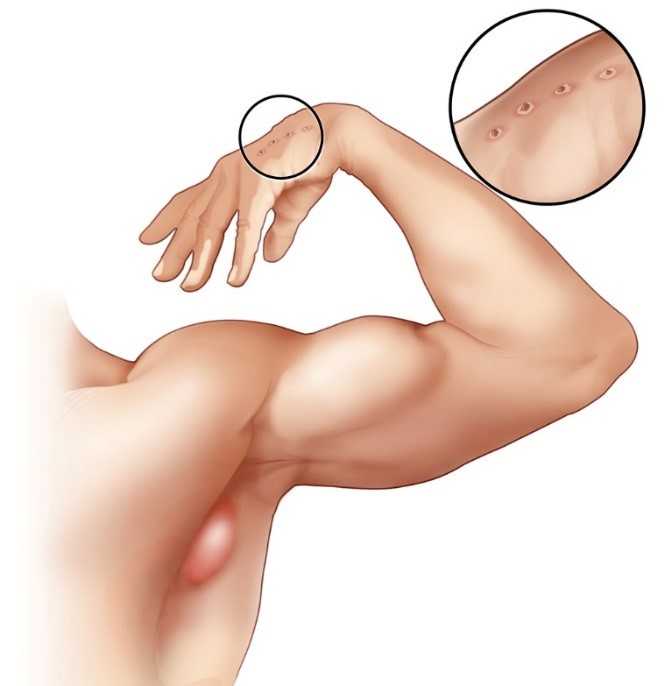Cat Scratch Disease FAQs

Swollen lymph node in armpit and cat scratch on hand
What is cat scratch disease (CSD)?
Cat scratch disease is a bacterial infection caused by Bartonella henselae bacteria. Most infections usually occur after scratches from domestic or feral cats, especially kittens. CSD occurs wherever cats and fleas are found. The most common symptoms include fever; enlarged, tender lymph nodes that develop 1–3 weeks after exposure; and a scab or pustule at the scratch site. In the United States, most cases occur in the fall and winter and illness is most common in children less than 15 years old.
My cat is completely healthy. How can it carry an infection?
Cats become infected with Bartonella (the bacteria that cause cat scratch disease) through flea bites or, less commonly, fights with other infected cats or feline blood transfusions. While some cats become ill, most simply carry the bacteria in their blood without getting sick. Some studies have found the Bartonella bacteria in the blood of up to 1/3 of healthy cats, particularly kittens.
Should I get my pet treated for Bartonella, just to be safe?
Treatment is not recommended unless your pet becomes sick. Treating Bartonella with antibiotics can take a long time and it’s considered safer and more practical to let the pet handle the infection naturally. For cats that do become sick, the illness usually consists of fever for 2-3 days, with the cat recovering on its own. Symptoms requiring veterinary care include fever, vomiting, lethargy, red eyes, swollen lymph nodes or decreased appetite.
My daughter got scratched by the neighbor’s kitten and now my husband is worried about “cat scratch disease.” How worried should we be?
Most cat scratches do not result in cat scratch disease, and short of cleaning the wound with soap and water, there is no particular action to take. If your child develops a fever; enlarged, tender lymph nodes that develop 1–3 weeks after being scratched; or a pustule at the scratch site, please take her to your health care provider. Treatment with antibiotics is usually not necessary but may help reduce lymph node swelling.
I have a medical condition that affects my immune system. Should I give my cat away?
If you’re HIV-positive, are being treated for cancer, or have any other condition that might disrupt your immune system, you can keep your cat. Just keep the following points in mind:
- Keep the cat indoors.
- Avoid rough play with cats and situations in which scratches are likely. Declawing is not recommended.
- Promptly wash any cat scratches or bites with soap and water.
- Avoid contact with fleas.
- Treat the cat with a flea control product recommended by your veterinarian.
- It’s not necessary to test or treat a healthy cat for Bartonella.
- If you are getting a cat, make sure it’s at least a year old, in good health, and free of fleas. Avoid stray cats and cats with flea infestations.
- Page last reviewed: January 11, 2016
- Page last updated: January 11, 2016
- Content source:


 ShareCompartir
ShareCompartir